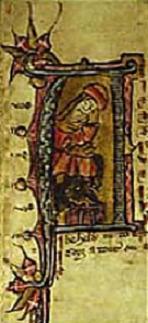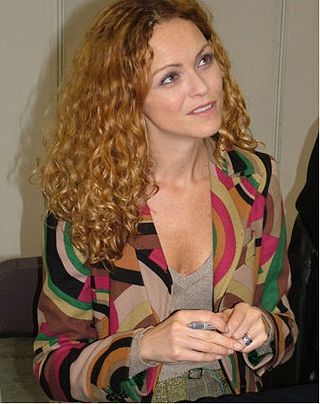
Lollardy, also known as Lollardism or the Lollard movement, was a proto-Protestant Christian religious movement that was active in England from the mid-14th century until the 16th-century English Reformation. It was initially led by John Wycliffe, a Catholic theologian who was dismissed from the University of Oxford in 1381 for criticism of the Roman Catholic Church. The Lollards' demands were primarily for reform of Western Christianity. They formulated their beliefs in the Twelve Conclusions of the Lollards.

Piers Plowman or Visio Willelmi de Petro Ploughman is a Middle English allegorical narrative poem by William Langland. It is written in un-rhymed, alliterative verse divided into sections called passus.

William Langland is the presumed author of a work of Middle English alliterative verse generally known as Piers Plowman, an allegory with a complex variety of religious themes. The poem translated the language and concepts of the cloister into symbols and images that could be understood by a layman.

Erythroxylum coca is one of two species of cultivated coca.

Anna-Louise Plowman is a New Zealand-born actress.

Pierce the Ploughman's Crede is a medieval alliterative poem of 855 lines, lampooning the four orders of friars.

Chandris Line was a Greek shipping company founded in 1960 by Antonios Chandris to operate ocean liners between Greece and Australia. Initially the company also traded under the names Greek Australian Line, National Greek Australian Line and Europe-Australia Line.
There are two pseudo-Chaucerian texts called "The Plowman's Tale".
Jack Upland or Jack up Lande is a polemical, probably Lollard, literary work which can be seen as a "sequel" to Piers Plowman, with Antichrist attacking Christians through corrupt confession. Jack asks a "flattering friar" nearly seventy questions attacking the mendicant orders and exposing their distance from scriptural truth.
The Piers Plowman tradition is made up of about 14 different poetic and prose works from about the time of John Ball and the Peasants Revolt of 1381 through the reign of Elizabeth I and beyond. All the works feature one or more characters, typically Piers, from William Langland's poem Piers Plowman. Because the Plowman appears in the General Prologue to The Canterbury Tales by Geoffrey Chaucer but does not have his own tale, plowman tales are sometimes used as additions to The Canterbury Tales, or otherwise conflated or associated with Chaucer.

Erythroxylum (Erythroxylon) is a genus of tropical flowering plants in the family Erythroxylaceae. Many of the approximately 200 species contain the tropane alkaloid cocaine, and two of the species within this genus, Erythroxylum coca and Erythroxylum novogranatense, both native to South America, are the main commercial source of cocaine and of the mild stimulant coca tea. Another species, Erythroxylum vaccinifolium is used as an aphrodisiac in Brazilian drinks and herbal medicine.
Thomas Brinton was a medieval Bishop of Rochester.

HMS Nairana was a passenger ferry that was requisitioned by the Royal Navy (RN) as a seaplane carrier in 1917. She was laid down in Scotland in 1914 as TSS Nairana for the Australian shipping line Huddart Parker, but construction was suspended after the outbreak of the First World War. Following resumption of work, the ship was launched in 1915, and converted to operate wheeled aircraft from her forward flying-off deck, as well as floatplanes that were lowered into the water. She saw service during the war with the Grand Fleet, and in 1918–19 supported the British intervention in the Russian Civil War.
Mark Plowman, generally known as Max Plowman, was a British writer and pacifist.
Michael Richard Plowman is a British composer and conductor, based in London, UK, Los Angeles County, California, and Vancouver, British Columbia, Canada.
The Adelphi or New Adelphi was an English literary journal founded by John Middleton Murry and published between 1923 and 1955. The first issue appeared in June 1923, with issues published monthly thereafter. Between August 1927 and September 1930 it was renamed the New Adelphi and issued quarterly. Murry was editor until 1930, when he handed over to Sir Richard Rees and the monthly issues resumed. Rees was succeeded by Max Plowman in 1938. The magazine included one or two stories per issue with contributions by Katherine Mansfield, A.A. Milne, D. H. Lawrence, H. E. Bates, Rhys Davies, G.B. Edwards and Dylan Thomas. The Adelphi published George Orwell's "The Spike" in 1931 and Orwell contributed regularly thereafter, particularly as a reviewer; in the late 1930s/early 1940s, working class writers Jack Common and Jack Hilton also contributed.

Phenoxypropazine is an irreversible and non-selective monoamine oxidase inhibitor (MAOI) of the hydrazine family. It was introduced as an antidepressant in 1961, but was subsequently withdrawn in 1966 due to hepatotoxicity concerns.
The Trinity Gower D Scribe, often referred to simply as Scribe D, was a professional scribe and copyist of literary manuscripts active during the late fourteenth and early fifteenth century in London, England. Although his real name long remained unknown, Scribe D has been described as "so well known to students of late Middle English manuscripts that he hardly needs any introduction".

Sir John Anthony Plowman was a British barrister and judge who served as Vice-Chancellor between 1974 and 1976.
Kathryn Kerby-Fulton is a Canadian historian and Professor Emerita of English at the University of Notre Dame.









